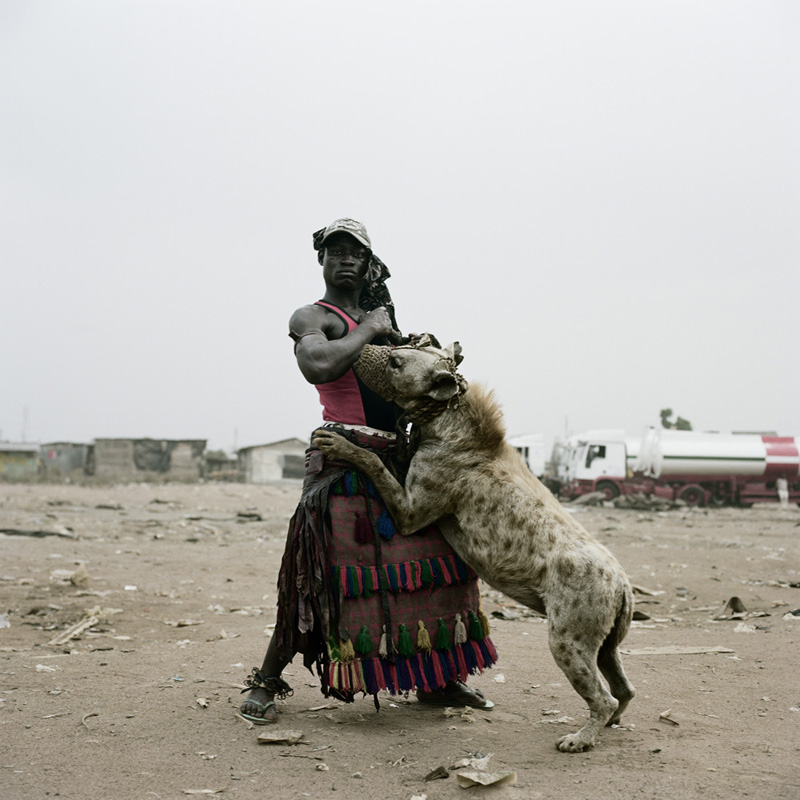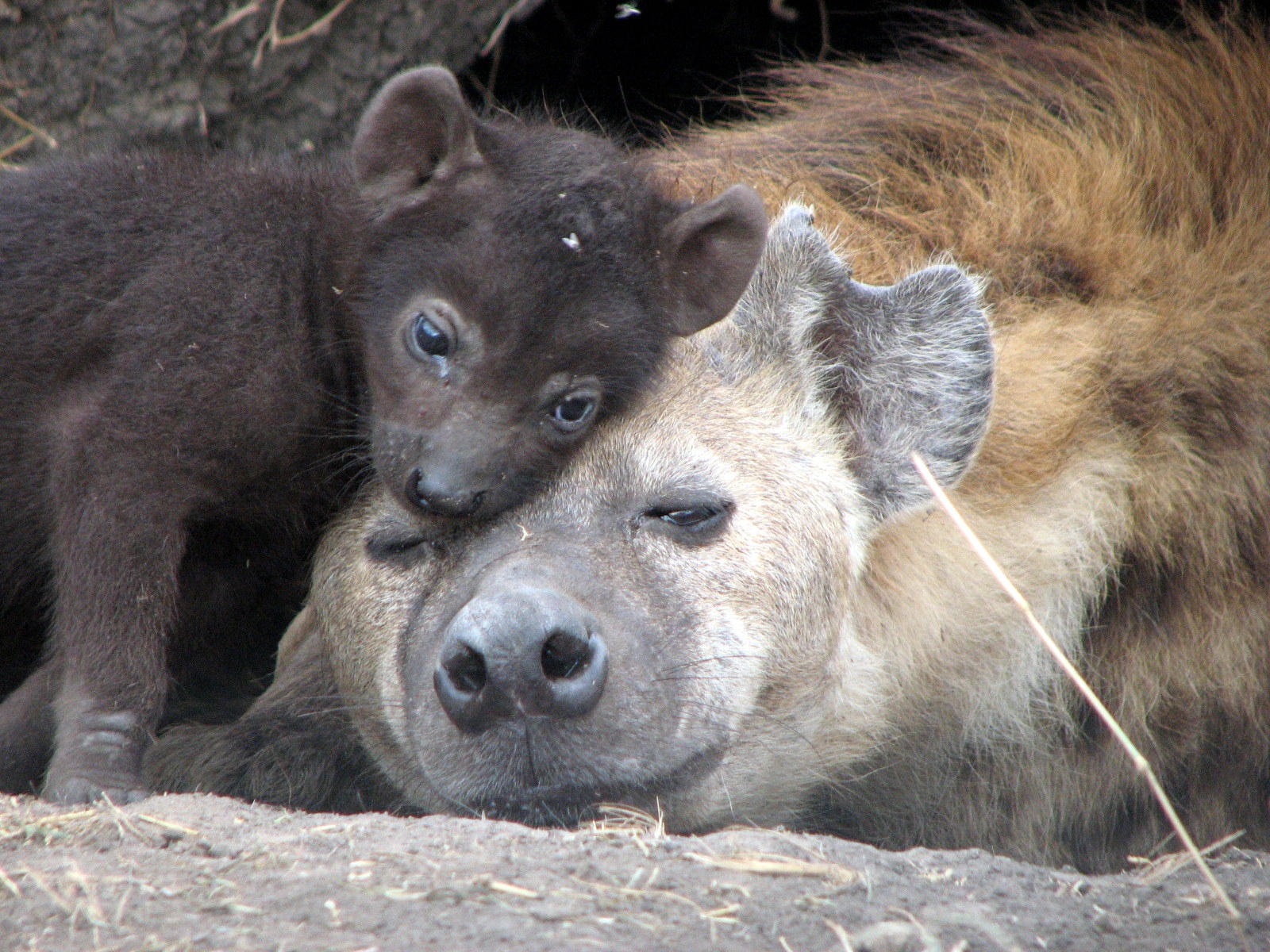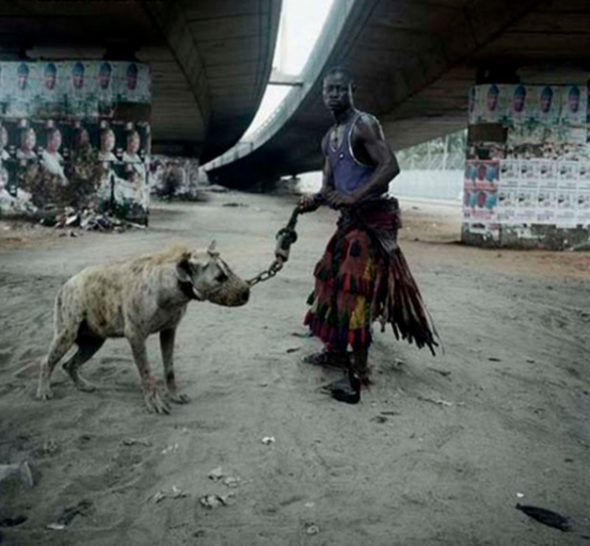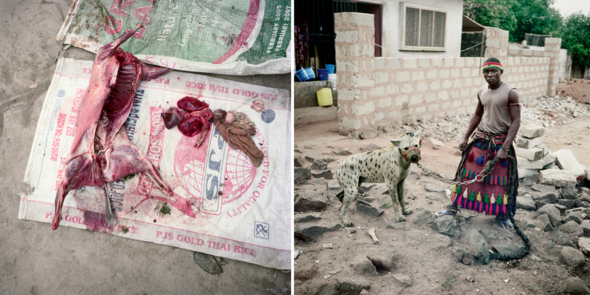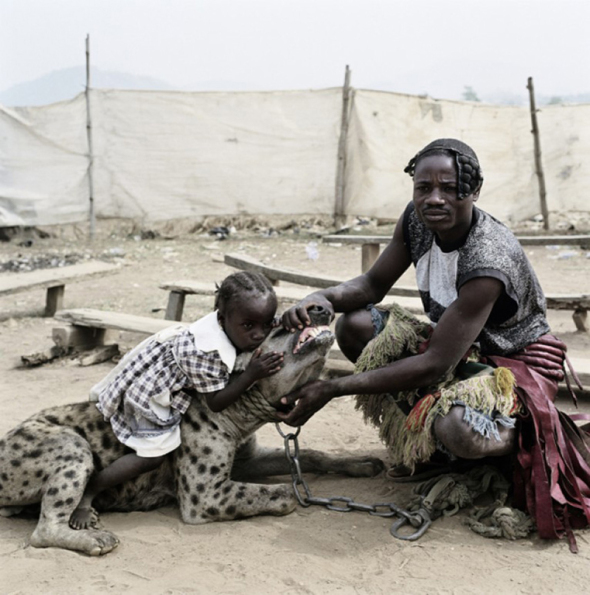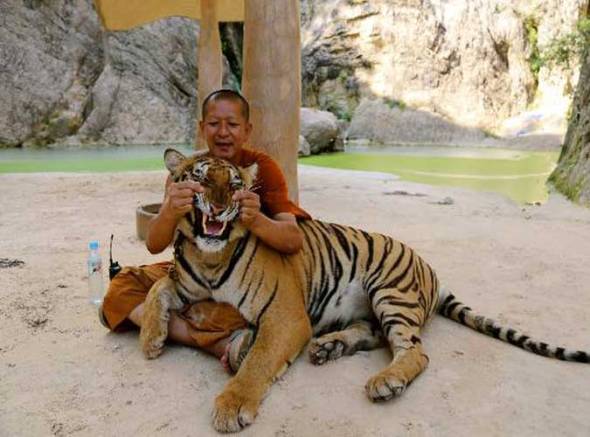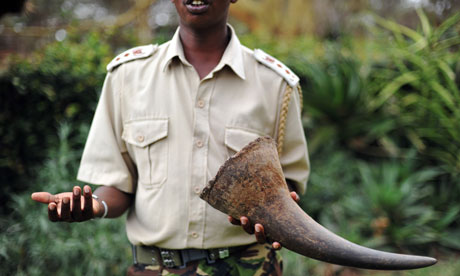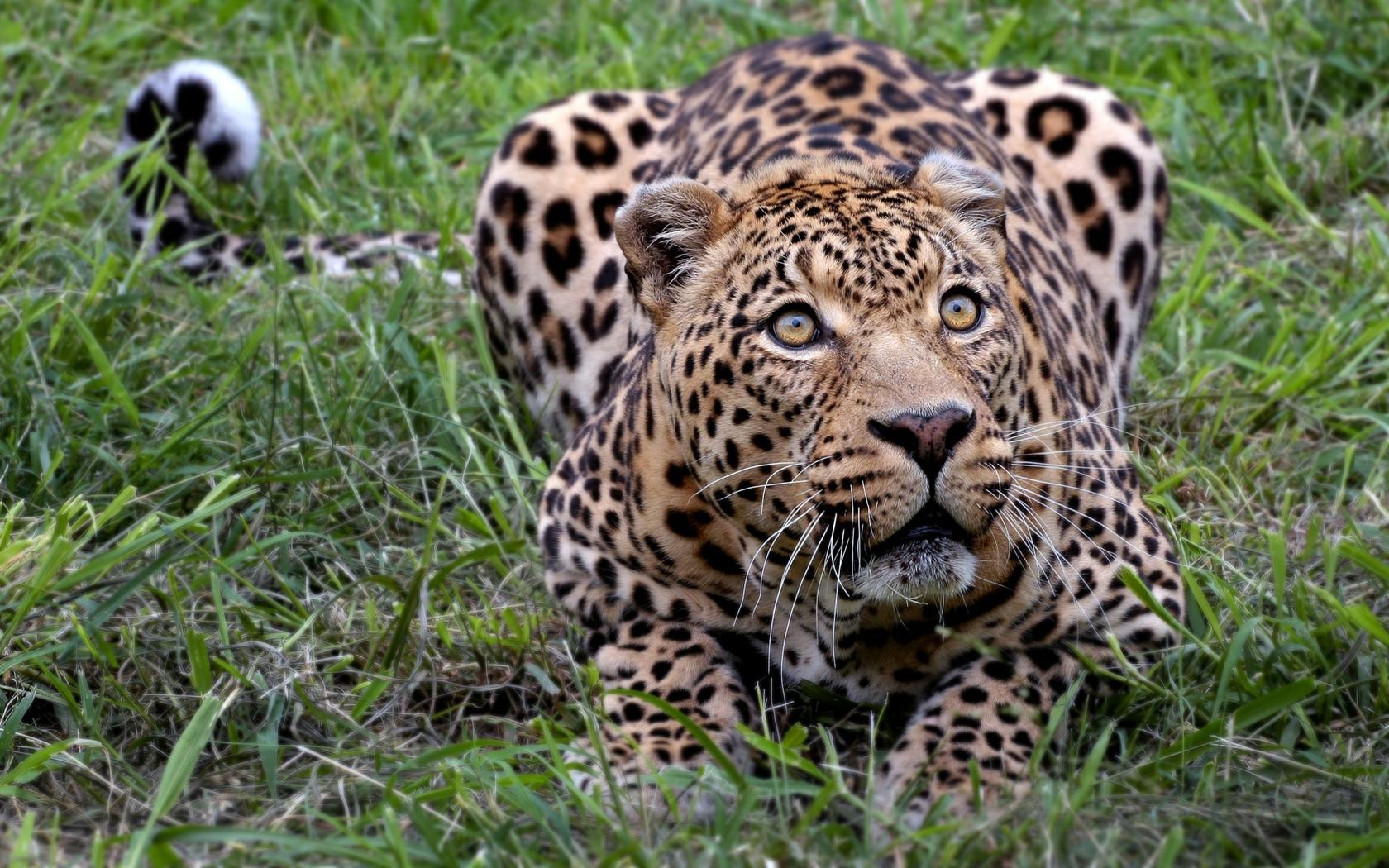Africa: Culture, Abuse & Crime. Hyena Boys.
Abuse or Culture?
Its been a long time since I last documented on the hyena men within Nigeria. My last article was more focusing on why men feel the need to take any animal from its natural habitat, drugging the animals into submission thus in a way domesticating them. Peter Hugo was one of the very first men to document and illustrate on this rather strange and morbid behavior of both man and animals.
This Wednesdays article focuses more on whether such domestication of wild hyenas (or any animals from the wild) is considered abusive or culture and, will such a “fashion trend” spread into neighboring countries on the continent of Africa? Yes, you did just read that correctly - hyenas are seen by some people (mainly men) within Nigeria as a fashion statement over dogs. Yet the hyena is more closely related to cats and not dogs.
Brief hyena history:
Hyenas or hyaenas (from Greek ὕαινα hýaina) are the animals of the family Hyaenidae /haɪˈɛnɨdiː/ of the feliform suborder of the Carnivora. With only four extant species, it is the fifth-smallest biological family in the Carnivora, and one of the smallest in the class Mammalia. Despite their low diversity, hyenas are unique and vital components of most African ecosystems.
Within Western African tradition hyenas have been known to mingle and interact with humans. The spotted hyena was considered a “bad Muslim” who challenge the local animism that exists among the Beng in Côte d’Ivoire. In East Africa, Tabwa mythology portrays the spotted hyena as a solar animal that first brought the sun to warm the cold earth, while West African folklore generally shows the hyena as symbolizing immorality, dirty habits, the reversal of normal activities, and other negative traits. In Tanzania, there is a belief that witches use spotted hyenas as mounts.
In the Mtwara Region of Tanzania, it is believed that a child born at night while a hyena is crying will likely grow up to be a thief. In the same area, hyena faeces are believed to enable a child to walk at an early age, thus it is not uncommon in that area to see children with hyena dung wrapped in their clothes.
Image: Hyena and cub.
The Kaguru of Tanzania and the Kujamaat of Southern Senegal view hyenas as inedible and greedy hermaphrodites. A mythical African tribe called the Bouda is reputed to house members able to transform into hyenas. A similar myth occurs in Mansoa. These “werehyenas” are executed when discovered, but do not revert to their human form when killed. In all hyena’s are pretty much disliked among many traditional communities and are thought to bring a whole host of bad spirits and bad luck.
The hyena men and hyena man:
There are two groups of hyena men known. The first resides in Nigeria known as travelling performers while in Ethiopia there remains a “hyena man” rather than “men” named as Yusef. The Nigerian hyena men were first photographed by Peter Hugo. Nigerian hyena men are known to capture hyena’s, baboons and pythons of which are then tamed aggressively which we believe the use of powerful narcotics or veterinary tranquilizers are used to heavily subdue or sedate the animals removing their primal hunting instincts and natural behavior thus converting to human slavery.
Noted as travelling performers the hyena men are said to care for their animals while travelling the country followed by many whom shower the men with Naira (Nigerian currency). From observing reports it seems that the hyena men are really no different to the Monks of Tiger Temple in Indonesia. Drug and herbal concoctions are administered to subdue the animals before being captured and when on display to ensure the men are not injured or even killed by these aggressive carnivores. Peter Hugo also described how the men bathe in an unknown medical concoction of herbs as well as drinking medicinal concoctions in the belief that this will protect the men from harm when hunting and capturing the animals for later human domestication.
On hunting the hyena down with dogs the men are then said to blow a white tranquilizing powder into the face of the hyena in the hope to subdue it once the beast has been coaxed out its den. Once the hyena is subdued the men are then said to cage the animal before bringing the animal back to the local village community. Mr Hugo described that when the hyena’s are captured the hyena men then rub a unknown medicine onto the body of the hyena that is said to make the animal completely obedient.
Environmental News and Media are not quite sure as to what the medicine is or even if any such “medical rub” is administered that has any form of active properties to help subdue the animals. Its quite possible the “white powder” that is blown into the face of the animal could be “Diazepam” which would explain why the animal is then quickly subdued and for long periods of time. We don’t believe that any such skin rub that is administered to the animal would then make the animal[s] completely obedient. For such a large predatory animal to be subdued completely one would require a significantly large dose of analgesia, opiates or a stronger barbiturate to fully contain and subdue the animal. That would then be considered as abuse and something which is a violation under the Nigerian Animal Welfare Law.
Image: Hyena boys with muzzled Hyena.
Once the hyena is under the complete control of its handlers the handler will then teach the animal performing tricks and, how to live with its captive abductors (see video below). We do find this again quite baffling to take on board as hyena’s are natural born killers, very predatory and, on viewing the imagery taken by Peter Hugo it clearly shows multiple hyenas heavily chained and muzzled. So in all fairness while some people have been led to believe this is all OK its quite possible that these stunning animals are being fed a heavy dose of tranquilizers and/or depressive human or animal related relaxation medications.
Due to Nigeria’s rampant poverty the handlers were/are “allegedly forced” to parade their captive animals through the local community streets of which any raised money is said to be used to fend and care for the animals well being. In reality any money that is raised or stolen is used to feed their alleged narcotic habit and crime.
Baboons will perform a variety of tricks of which money is handed over to either animal or animals handler. Unfortunately the main earners are hyenas. Another concern raised was that many abducted animals are sold onto zoological gardens within the country that’s seen as another money maker. Peter Hugo quoted “The hyena men of Nigeria do more than simply put on a street show but they provide medicine to the public and more importantly stimulate the economy of whatever area they are in as well as act as a cultural product from the area”.
Meanwhile on the outskirts of Harar, Ethiopia another hyena man is said to exist known as Yusef. Yusef does not make money from animal performances but more admires their attention - despite these animals belonging to the wild and can at times be very unpredictable. Every night Yusef will feed the visiting hyenas with mule and camel meat. In a way these species of hyena seem to tolerate Yusef and also enjoy his company of which Yusef treats them like domesticated dogs. Many people in Harar are said to actually worship the hyena and treat them with the utmost respect which could explain why they’re not kept as performing animals but left to live how they should within their natural habitat.
Crime and exploitation:
Moving back to the Nigerian hyena men local press and media that picked the story up few years back were quoted as stating “that these men were bank robbers, bodyguards, drug dealers and debt collectors”. Between March 7th and 15th 2015 a local man named as Mr Mohammed Nafiu aged 27 who has been “suspected” of being part of the hyena men group was arrested and charged after using baboons and pythons to rob people within the country.
He pleaded not guilty to the charges. However, the prosecutor, ASP Eranus Nnamonu insisted that the accused committed the offences on March 7 and 17 when he terrorised the residents of Ogba and Ijaiye in Lagos.
He said Mr. Nafiu, armed with a fully grown baboon and a venomous snake, also terrified a crowd waiting to board a bus at Ogba Bus Stop. Mr. Nnamonu said the accused isolated a witness, Joshua Odogwu, and thereafter obtained N57, 000 from him.
“The obviously terrified victim dropped all he had in his bag along with N57, 000 cash, which the accused collected,” he said. In addition, he said the accused had on March 17 visited the shop of a man, Henry Ugwuokoh, and forcefully obtained N230, 000. The offences, Mr. Nnamonu noted, contravened Sections 166, 294, 295 and 409 of the Criminal Law of Lagos State, 2011. In her ruling, the Magistrate, Abimbola Komolafe, granted the accused bail in the sum of N100, 000 with two sureties in like sum and adjourned the case to June 18 2015 for trial to be held tomorrow.
Recently back in 2014 a local documentary-maker Tarryn Crossman won the award for Best Documentary Short for Hyena Boys at the California International Shorts Festival. Despite much criticism and debate from Carte Blanche, 50/50 and environmental and animal welfare groups the “award winning short film” was aired. Since Peter Hugo’s capture on the hyena men now known as the hyena boys, countless film, documentary producers and organisations have visited the group of men headed by Baba Mohammed that is in our eyes creating the wrong image and sending the wrong message to many people that abducting a wild animal to generate money from street performances is OK?
As explained its not just hyena’s that are taken from the wild and held in solitary confinement. Baboons, reptiles, snakes and small monkeys are also removed illegally from the wild. Furthermore the animals are also sold on to individuals within the communities as “pets” or as seen in the image below killed for meat to feed the locals.
Image: Hyena meat carcass and Hyena boy with muzzled hyena.
Yahaya one of the Nigerian, Lagos “hyena men” was quoted as saying “Any animal that people want, we can get for them,’ said Yahaya, who claims that they have supplied hyenas, pythons and other animals to zoos in Nigeria, Cameroon, Burkina Faso and Benin. ‘A mature hyena is sold for one hundred and fifty thousand naira, but a cub is more expensive at two hundred and fifty thousand naira. This is because a cub can be trained. An adult baboon goes for fifteen thousand naira, a young one for eight thousand. A python goes for eight to ten, depending on the size.’”
What has turned in to a street performing activity to make money to “allegedly” feed the impoverished has clearly been heavily exploited too. Capturing these stunning animals from the wild to perform or to sell on as meat or pets is wrong and any film production team that honestly believes this is totally OK are foolish and supportive of animal captivity, abuse and, exploitation.
The entertainers have also been accused by the Nigerian police of using the animals to threaten or intimidate members of the public into parting with money or possessions. In June 2004 a report in Lagos newspaper This Day claimed that an armed ‘gang who used a hyena and a monkey to rob their victims’ had a shootout with police. The report can be read below:
June 2004: Four armed man suspected to be from the group “hyena boys” held up a bank with baboons and hyenas.
Four armed gang who used a hyena and a monkey to rob their victims in Katsina State have been arrested by the police after a gun duel in Bichi, headquarters of Bichi Local Government of Kano State. According to a statement made available to newsmen in Katsina, the robbers who were seven in number went to Kankia market in Kankia Local Government of Katsina State to display with the animals while they robbed their victims of N66,000 during their operation.
Shortly after their operation, the statement added, the robbers took to their heels and they were chased by the police down to Bichi in Kano State where they engaged the police in a gun battle which led to the death of two of the robbers. During the battle with the police, the gang let off the hyena and monkey to fight with the police during which the animals bit one of the policemen who is now lying critically ill at the Katsina General Hospital.
Two of the robbers were killed while four of them arrested on the spot. The police had however killed the two animals during the fight in Bichi. Meanwhile, two robbers have been arrested by the police in Funtua for allegedly burgling the home of the former Minister for Special Duties during the Abacha administration in the country Alhaji Wada Nas.
The hyena boys are known to deal heavily in narcotics which the film crew producer Tarryn Crossman confirmed on visiting the hyena boys back in 2014. Tarryn Crossman stated that on entering the camp they walked into a large camp populated with many people and cannabis laying everywhere. Tarryn Crossman’s own words “We thought we were going to die”.
Captive cruelty and abuse:
For years International Animal Rescue Foundation Africa has documented on animal abuse and captive cruelty however, nothing can be more cruel and abusive than this. Abducting wild animals from their natural habitat with vicious dogs, using hypnotic medications to subdue the animals and beating the animals should they not do what their masters demand. It really baffles us as to why any such film or press agency would even document on such so called traditions knowing their abuse that goes on within camp and outside of camp.
Wild animals in captivity are often anxious about being cooped up. And the stressors of social animals can sound strikingly similar to the popularity concerns of high school girls. Mark Wilson, a neuroscientist at Yerkes National Primate Research Center of Georgia’s Emory University, studies captive female rhesus macaque monkeys, housed in groups as they would live in the wild. The monkeys naturally form a hierarchy with some females dominating others, and subordinates enduring harassment and a general lack of control.
Furthermore and even more worrying is the sheer fact the hyena boys have not tamed wild caught adult hyenas at all. The only thing stopping these dangerous carnivores from ripping their owners to shreds are illicit “unknown” medications that help to subdue the animal and take its inhibitions away therefore doing everything the owner or owners bark at the hyena or other animals. I
have included two images for you to clearly evaluate from research. One depicts an non-muzzled adult hyena and a Tiger from the repulsive Tiger Temple. Both hyenas and tigers are dangerous animals of which their natural instincts are to hunt and be predatory. I have searched in vain for as many images as possible depicting non-muzzled hyenas from the hyena boys camp however, to no avail.
Image (1) and (2) Drug induced state - Subdued Hyena and Tiger.
As one can quite clearly see both tiger and hyena are being man-handled. Neither animals would if not drugged take this abusive treatment for very long before lashing out and seriously harming the owner[s]. Which has led us to believe since Peter Hugo first documented on the hyena boys, the hyenas are clearly drugged with either cannabis that was witnessed at the camp in 2014 by film producer Terryn Crossman or heroin. Furthermore individuals from the Australian organisation known as (Cee4life) have been quoted as witnessing cannabis being fed into Tiger food and possibly Sativex, a liquid cannabis tincture.
Further research and accounts from the hyena men have generally stated that hyenas make very good pets and as they are related to dogs they’d be the ideal candidate for home security. Furthermore my research conducted last year of which I located a earlier video of the hyena men stating “hyenas are the new black mans dogs, pit bulls are for sissies”. So, lets debunk this. Firstly hyenas are nowhere near related to dogs. Hyenas are actually more related to cats. Keeping hyenas as pets is considered the “new image” within Nigeria however, do hyenas actually make good pets?
Although a few people in Africa and Asia find very young hyenas in nature and raise them as pets, these animals generally appear to be extremely unhappy as “domestic companions” as adults, and must often be kept muzzled at all times so that they do not harm people or property One only has to view the videos above that clearly illustrates their unhappiness at being chained and muzzled. A muzzle prevents the hyenas from being able to groom itself properly.
As spotted hyenas need several years of practice to become proficient hunters, and as they are deprived of this practice when reared as pets, it is effectively a death sentence for a captive-reared hyenas to be released into the wild. In addition, pet hyenas cannot be released for fear that they might transfer new pathogens from captive environments into the wild. Upon reaching adulthood, many “pet” hyenas must therefore be euthanized.
Concluding:
I have researched many so called traditions and cultures over the years involving humans and wild animals removed from their natural habitat to be used in street or circus performances or domesticated as pets. Never within my entire career have I yet to locate any real evidence that indicates large predators, monkeys or apes are suited to domestication or take to being used as performing animals. Large predators, monkeys and apes belong in the wild and not within a human controlled environment. It is therefore in my own expert opinion the Nigerian Government must act to firstly ban such cultures and remove these animals either placing them into a more suited human controlled reserve or, unfortunately euthanizing them immediately. We as humans do not have the rights to wander into any animals natural habitat to abduct and then exploit for monetary greed. We are playing with fire here and opening Pandora’s box furthermore to virus’s jumping from animal to human. 75% of all known virus actually derive from animals.
Thank you for reading.
Dr Jose C. Depre
Environmental and Botanical Scientist.
International Animal Rescue Foundation (Africa, Europe, Canada, America, Asia, South America).

